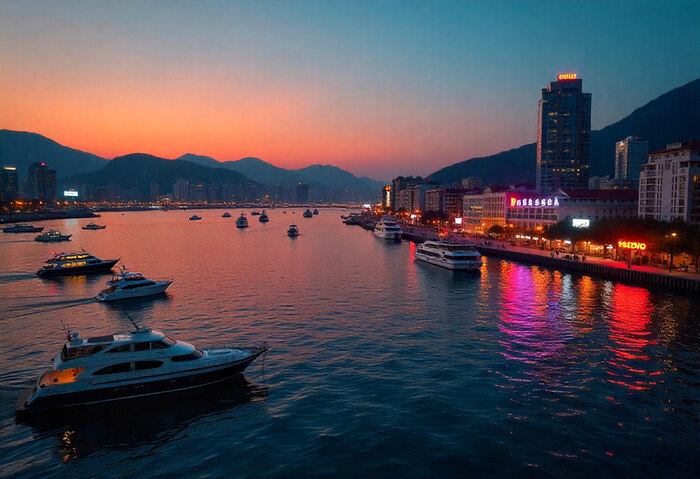Published on
September 19, 2025
Macao has risen as a premier global hub for gaming and tourism, standing alongside influential and wealthy regions such as the US, Norway, UAE, Switzerland, Qatar, Singapore, and Luxembourg. Its meteoric growth is powered by a booming casino industry that far outpaces Las Vegas in revenue, complemented by a dynamic tourism sector featuring luxury resorts, world-class entertainment, and a vibrant cultural scene. Situated in the Pearl River Delta near Hong Kong and mainland China, Macao draws millions of international visitors annually. The territory’s UNESCO-listed historic centre, iconic landmarks, and seamless blend of Portuguese and Chinese heritage elevate its appeal, while a strong financial and investment ecosystem cements its position as a thriving economic powerhouse in Asia.
Known as the “Las Vegas of Asia,” Macao has also gained recognition as one of the world’s wealthiest regions. Despite its compact size along China’s southern coast, the territory combines remarkable economic strength with rich cultural traditions, making it a unique and unforgettable destination in the heart of Asia.
Macao consists of a compact peninsula and two adjoining islands within the Pearl River Delta. To the north, it borders China’s Guangdong Province, while to the east and south, its shores open to the South China Sea. Despite its small size—roughly 30 square kilometres—the territory houses close to 700,000 residents and has transformed into an economic and tourism powerhouse.
The Global Capital of Gaming
Since the late 20th century, Macao has risen to global prominence as a resort hub and gambling tourism centre. Its casino industry is unparalleled, generating revenue more than seven times greater than that of Las Vegas. Today, the region is home to more than 40 gaming establishments, ranging from colossal integrated resorts to boutique casinos. This thriving sector has not only cemented Macao’s place as the world’s gambling capital but has also created one of the most profitable commercial environments anywhere.
Beyond Casinos A Cultural and Historical Treasure
While gaming dominates headlines, Macao is far from a one-dimensional destination. The region boasts a rich cultural legacy shaped by centuries of Portuguese and Chinese influences. Its UNESCO-listed historic centre showcases this blend through cobblestone streets, colonial churches, pastel-hued squares, and intricate Chinese temples. Iconic landmarks such as the Ruins of St. Paul’s, A-Ma Temple, and Fortaleza do Monte stand as reminders of Macao’s storied past.
This cultural richness extends beyond architecture. Traditional festivals, religious celebrations, and local art exhibitions infuse the city with energy throughout the year. Together, these attractions draw millions of visitors, strengthening tourism revenues beyond the casino floors. Hotels, shopping centres, and entertainment venues benefit from this steady influx, reinforcing Macao’s broader economic model.
Economic Strength Beyond Tourism
Macao’s prosperity is not solely tied to gaming and tourism. The territory also serves as a regional banking and financial services hub, offering insurance, investment, and international trade support. Its status as a free port and special administrative region makes it an attractive base for multinational corporations seeking access to Asian markets.
Strategically located near Hong Kong and mainland China, Macao functions as a vital gateway for commerce in the Pearl River Delta. This geographic advantage allows the territory to capture both international business and cross-border tourism, ensuring a diversified and resilient economy.
A Culinary Crossroads
Food plays a central role in the Macao experience, with its cuisine reflecting centuries of East-meets-West fusion. The local dining scene is a dynamic mix of Portuguese and Chinese flavours. Signature dishes include the world-famous Portuguese egg tart, African chicken, and seafood rice, each telling a story of cultural blending.
Street food stalls bustle with local snacks, traditional eateries serve beloved recipes passed down through generations, and Michelin-starred restaurants present innovative interpretations of classic flavours. This vibrant food culture adds yet another layer to the territory’s international appeal.
Modern Attractions and Entertainment
In addition to heritage sites, Macao offers world-class modern attractions. Luxury shopping malls line the Cotai Strip, featuring high-end international brands and extravagant retail experiences. Cutting-edge performance venues host concerts, acrobatic shows, and global entertainment acts, while contemporary art museums and cultural centres provide depth beyond leisure.
Festivals celebrating film, music, and gastronomy bring global attention to the region, highlighting Macao’s role as more than just a gaming centre but as a cosmopolitan destination where tradition meets innovation.
Global Wealth Ranking
Macao’s financial success has positioned it among the top ten wealthiest regions worldwide. According to recent rankings, it stands fifth on the global list of richest countries and territories, surpassing established economies such as Switzerland and the United States.
The top ten wealthiest regions are:
10. United States
9. Norway
8. San Marino
7. United Arab Emirates
6. Switzerland
5. Macao
4. Qatar
3. Singapore
2. Ireland
1. Luxembourg
This remarkable achievement underscores the strength of Macao’s economy, built on tourism, finance, and trade, supported by its strategic positioning in Asia.
A Destination Like No Other
Macao represents a rare fusion of wealth, culture, and entertainment. From bustling casino floors to serene temple courtyards, from Portuguese-inspired delicacies to dazzling modern shows, the region offers a multifaceted experience unlike anywhere else in the world.
As it continues to balance tradition with innovation, Macao stands not only as one of the richest territories globally but also as a unique destination where history and modernity coexist in spectacular harmony.
